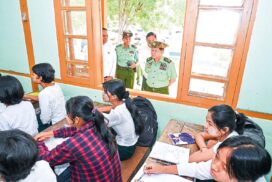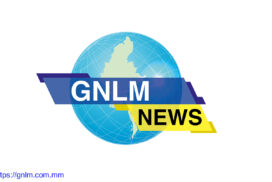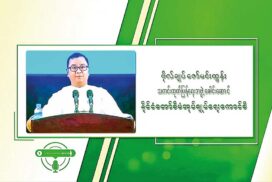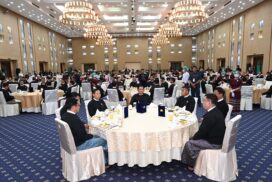Esteemed ethnic national brethren of the Union,
First and foremost, I would like to extend my sincere greetings and warm wishes to all those who participated in the Nationwide Ceasefire Agreement (NCA) eight years ago, all ethnic leaders who contributed to the signing of the NCA agreement, local and international witnesses and all national brethren residing in the Union for your personal well-being and for the further success in your peace efforts in serving the interests of the country.
Today marks the eighth anniversary of the signing of the Nationwide Ceasefire Agreement (NCA). The call for peace by the first multi-party democratic government is to build sustainable peace based on the NCA and the outcomes of subsequent discussions with the Ethnic Armed Organizations (EAOs). During the NCA negotiation and drafting processes, the Ethnic Armed Organizations (EAOs) were present there to discuss and negotiate their needs. The government compiled those requests and formalized into a State-level agreement and legalized it. The NCA was concluded with an aim of achieving peace that is prerequisite for our country, the NCA is also a historical milestone that embodies concessions, magnanimity, patience and desire for peace that has never been seen in Myanmar’s history.
The NCA was not easily achieved. It took 1,450 days from the invitation extended for peace talks to the conclusion of the NCA. During these days, over 5,000 meetings including series of small discussions and negotiations were held. This has resulted in the grand signing of the NCA by the Government, the Hluttaw, the Tatmadaw, Political Parties and Organizations, Ethnic Representatives and the Ethnic Armed Organizations (EAOs) in the presence of international and local witnesses including the United Nations on 15 October 2015. As the NCA, ratified by the Pyidaungsu Hluttaw as a Union Accord, will remain in force eternally and not subject to nullification, the Tatmadaw attaches great importance to the implementation of the NCA agreement.
Esteemed ethnic national brethren of the Union,
Myanmar has been inflicted by internal armed conflicts for over 75 years which emerged together with the independence. The causes of armed conflicts need to be analyzed. Understanding the past experiences will come to realize the weak points of the present time which will also be helpful for the future. Myanmar was annexed by the British colonialists three times starting in 1824 and trapped under British colonial rule. The British marginalized Myanmar with a divide-and-rule policy for over 100 years by enacting the Upper Myanmar Law on 29 November 1886, the Shan State Act in 1888, the Burma Village Act in September 1889, the Kachin Hill Tribe Regulations in 1895 and the Chin Hill Regulations in 1896, and by establishing the Feudal Council on 1 October 1922, which divided the ruling of the southern and northern parts of Shan State. The British colonized Myanmar by sowing seeds of disunity and mistrust amongst ethnic nationals with its century-long divide-and -rule policy. Furthermore, in governing the Myanmar mainland, the British practized the policy that led to as many divisions as possible. The “91 Department-Administration” system that they started practising in 1937, 132 Members of Parliament had to be elected at the Lower House to support their administration. In so doing, 13 from the cities, 78 from the rural areas, 12 from Kayin rural area, one Indian, two English mixed-races, two from the Indian Chamber of Commerce, one from the Chinese Chamber of Commerce, five from the Myanmar Chamber of Commerce were included. We could notice what could have been the intention from this kind of election in Myanmar where diverse ethnic groups resided. With their century-long divide-and-rule policy, the ethnic people became total strangers towards each other and lost trust among them.
The power struggle among political parties intensified following the independence on 4 January 1948. The internal conflict began on 28 March 1948 when the Communist Party of Burma (CPB) opted to take arms in settling political differences instead of peaceful means. In order to restore stability of the State, the Tatmadaw had to combat multi-coloured insurgent groups which disproportionately outnumbered the Tatmadaw. However, due to the joint counter-attacks of the people and the Tatmadaw against the communist rebels in Bago and Ayeyawady Regions, the rebels finally absconded to Kachin, Shan and Kayin States. The innocent ethnic nationals from these regions were conscripted by the communists who politically instigated them with “anti-government” and “ethnic liberation” campaigns. As a result of the long-term influence of the divide-and-rule policy of British colonialists and the flames of political instigation known as “ethnic liberation” ignited by the CPB, the Ethnic Armed Organizations (EAOs) sprouted out in Myanmar. Until now, there is no Ethnic Armed Organization (EAO) formed as a result of having grudges against the Tatmadaw. The internal armed conflicts were caused not by using political means but by taking arms in settling the political differences. The current circumstances in our country correspond to the armed conflicts in the aftermath of independence. The self-claimed supporters of democracy themselves committed voting fraud and opted for terrorist path by taking arms without settling legally and democratically. Certain countries which are said to be practising and protecting democracy have been directly or indirectly supporting and inciting commit armed terrorist acts which are totally contrary to democracy. These actions delay the multi-party democratic system aspired by the Myanmar people and support the dictatorship which is democracy in name only. Everyone should be aware of that. Our government will definitely continue to strive for the genuine disciplined multi-party democractic system aspired by the people. In this regard, we are making necessary preparations for the holding of free and fair multi-party general elections. I would like to stress that we will definitely hold the free and fair multi-party general elections that truly reflect wills of the voters.
Esteemed ethnic national brethren of the Union,
It is necessary to review our country’s historical background since independence. Myanmar has gone through the parliamentary democratic system from 1948 to 1962, the Revolutionary Council Government from 1962 to 1974 which laid foundation for socialism, socialist system from 1974 to 1988, and the foundation-laying period towards multi-party democracy from 1988 to 31 March 2011, and since 2011, it is still on its path towards democracy. The Tatmadaw has offered an olive branch for peace throughout successive eras. During the tenure of the Tatmadaw Government when the Ethnic Armed Organisations (EAOs) were invited to the peace process, peace was achieved with some EAOs and there were also cases where EAOs totally exchanged arms for peace. Peace was then achieved almost throughout the nation and all ethnic nationals enjoyed the fruits of peace practically. It was due to the common desire of the Tatmadaw and the Ethnic Armed Organizations (EAOs) for ceasefire and with belief of “the country to be peaceful and tranquil” without having any political texture. No formal accord as strong and legitimate as the NCA was concluded when peace efforts were undertaken during that period. There were only general agreements and pledges which are still pursued by certain organizations to date. These organizations are earnestly called upon to take the NCA trajectory that is firm, solemn and legitimate and to build lasting peace.
Esteemed ethnic national brethren of the Union,
The government cannot change the system of a country, which can only be changed by the will of the people. Our country practised the parliamentary democratic system from 1948 to 1962. Afterwards, a national referendum was held for the State Constitution 1974 on 3 January 1974 to change the country’s path towards socialism. With the support and mandate of the 90.19 per cent of the voters, Myanmar’s socialist political system was introduced. In 1988, in order to embark on the path towards the multi-party democratic system from one-party system as per the public demand, representatives of ethnic groups, intellectuals and scholars drafted the State Constitution 2008 and a national referendum was held on 29 May 2008. With the support and mandate of the 92.48 per cent of voters, the State Constitution 2008, which is practised today, emerged.
At this point, we need to be acutely aware of the way the NCA and the State Constitution were brought about. The NCA is a pledge and agreement between the government and the Ethnic Armed Organizations (EAOs). The State Constitution is a commitment and a guaranteed law between the government and the entire ethnic nationals of the country. The commitment between the two organizations should not supersede the commitment and guarantee for all citizens of different ethnic nationalities. While the NCA is the case, the provisions of the State Constitution are to be adhered to when measures are taken to amend the Constitution through the NCA. Thus, discussions are being held to seek common desires out of opinions, assumptions and demands of the Ethnic Armed Organizations (EAOs). When there are the calls and common desires for constitutional amendments, it will be discussed at the upcoming Hluttaws.
Esteemed ethnic national brethren of the Union,
Regarding the State Constitutions, our country has had three State Constitutions since independence to date. The first Constitution was the State Constitution 1947. It is a law designed for the independence which was hastily drafted with controversies and adopted only at the Constituent Assembly. The colonialists governed Myanmar with a divide-and-rule policy by various laws and administrative systems. In addition, they divided the country into hilly regions and the mainland in giving independence. In the history of the independence struggle, the political goal was set as “Independence is the first, independence is the second, and independence is the third” during (1941-1943) BIA, BDA era. In the pre-independence (1943-1945) BNA, PBF era, the political goal was set as “Independence is the first, Democracy is the second and the Socialism is the third”. It should be aware that Myanmar had the goal of establishing a socialist system since before independence.
However, there were no provisions related to socialism in the State Constitution 1947. While looking back to the historical evidence, the constitution was enacted based on the Aung San – Atlee Agreement which was signed on 27 January 1947 in London. At that time, various organizations held a belief that struggling to regain independence as soon as possible was the most important task. Only if the Burma Independence Bill was submitted in the British Parliament Session held in October 1947, it would have the chance to be approved by the said session and regain independence soonest. Therefore, it was found that the organizations involved in the independence could only include the provisions that were favoured by the British. If there was the term called socialism in a provision at that time, independence might have been delayed. Hence, the parliamentarian system was chosen, which the British practised in those days. Three months after regaining independence, the Communist Party of Burma (CPB) accused the independence as bogus and carried out underground activities of armed insurrection. The internal conflict emerged due to political and ideology differences. With the aim of settling issues in peaceful means, the Leftist Unity Council was formed on 16 July 1948 which released the 15 points Leftist Unity Principles. Some points had to be deleted due to the pressures by certain western countries. This is a clear testimony of interferences by those countries. Due to these direct and indirect interferences and instigations, the report of Frontier Areas Committee of Enquiry of 24 April 1947 primarily pointed out that the Constitution which would be practised after independence could be harmful for the Union as there were provisions for self-promulgation and separation and, therefore, should be cautious of. Against this backdrop, the future of the Union has become worrisome. Due to these uncertain events in the country, leaders who were involved in the independence struggle started to lay the foundation of socialism in the Revolutionary Council era.
Today, our firm political aim is to establish a Union based on democracy and federalism. The essence of democratic governance and federalism is co-existence, harmony, sharing and share of power. In democratic governance, the will of majority is to be implemented while minority’s will must be valued and respected in line with the practices of democracy. A prerequisite for establishing democracy and sustaining it will be the formation of a disciplined and law-abiding Myanmar society endowed with democratic spirit. This has to be carried out by the ethnic nationals and entire people of Myanmar.
In building federalism aspired by the entire ethnic nationals, it is necessary to seek a suitable federal system which would serve the long-term interests of the entire people and the Union. Our country is a nation built in the form of a Union since the era of ancient Kings. Since the Bagan Dynasty, also called the first dynasty in Myanmar’s history, the country was founded by the ethnic people. When Myanmar was colonized by the British, it was taken over as the Union known as Burma and then regained independence as a Union. The fact that the entire ethnic people recognized the current boundaries of the country in concluding boundary treaties with neighbouring countries firmly testifies that our country has stood up as a Union throughout successive epochs.
The founding of a Union that has stood throughout history, it is imperative to establish federal system that is fit and suitable for the country. For our country where diverse ethnic nationals reside, it is important to introduce federalism based on regions rather than ethnicity. Only then will we be able to avoid confederation which favours diversity and differences and could also lead to disintegration of the Union. The current State Constitution 2008 delegates executive power to regions, states, and self-administered areas. Chapter (1) Basic Principles of the Union and Chapter (8) Citizen, Fundamental Rights and Duties of the Citizens of the State Constitution stipulate that rights and guarantees for the people of the Union are granted equally. There is no reason to disagree on issues of politics, ethnics and religions. Practising the provisions and amending them in accordance with the law as deemed necessary can be considered as establishing federalism in a pragmatic manner.
Esteemed ethnic national brethren of the Union,
There are various types of democratic system. Today, our country is practising multi-party democracy. General elections are the essence and integral part of democracy. The people have experienced general elections throughout history. Since the parliamentary democratic system of Anti-Fascist People’s Freedom League (AFPFL) era to the multi-party democratic system of the previous general elections performed “first-past-the-post” system which culminated the absence of balance of power and it could be observed that ethnic parties hardly had the chance to participate in politics. There are eight main national races and more than 130 ethnic groups in our country. Thus, we have to build a strong federal Union with all the ethnic nationalities. Simply put, federalism stands for “coexistence and sharing”. When it comes to sharing, the “Proportional Representation System” (PR system) must be practised for the all-inclusive participation of ethnic groups, instead of “first-past-the-post” system that was practised in the previous elections. This is not the will of the State Administration Council alone. This is also the common will enshrined in the Nationwide Ceasefire Agreement (NCA) out of the proposals by the Ethnic Armed Organizations (EAOs). The basic principles set out in Chapter (1) of the Nationwide Ceasefire Agreement (NCA) include to “establish a Union based on the principles of democracy and federalism in accordance with the outcomes of political dialogue” and “guarantee equal rights to all citizens”. I would say that the Proportional Representation system (PR system) is the most suitable one for our country.
Esteemed ethnic national brethren of the Union,
During the term of the first democratic government that started in 2011, our country made progress on its path to democracy and achieved development to a certain extent. By the time the Nationwide Ceasefire Agreement was reached and fruitful results for peace were achieved, some traitors and foreign countries instigated the Ethnic Armed Organisations (EAOs) not to sign the Nationwide Ceasefire Agreement (NCA). However, eight ethnic organizations that are truly patriotic to the country and people and desirous of peace, stability and development signed the NCA agreement successfully. In addition, the signing of two more ethnic organizations to the agreement has made the total number of Ethnic Armed Organizations (EAOs) to ten to date. The remaining NCA non-signatory EAOs are invited to sign the NCA and to build peace. As soon as the Nationwide Ceasefire Agreement (NCA) was brought about, the Tatmadaw outlined a 6-point policy for peace talks. The Tatmadaw’s 6-point peace policy coincides with the essence of the NCA agreement, and that policy is also the “conscience” gained from peace efforts throughout different eras in history as well as the “realities” that must be done to firmly build peace today. The Tatmadaw has declared a unilateral ceasefire with effect from 21 December 2018 to 31 December 2023, end of this year.
The State Administration Council has laid down a Road-Map and Objectives since the assumption of state responsibilities. At present, a Five-Point Road-Map and nine Objectives have been outlined. One point in the Five-Point Road-Map is “to endeavour the peace process in line with the agreements set out in the Nationwide Ceasefire Agreement (NCA) as much as possible”. Likewise, it can be seen that one out of the nine objectives is “to give special consideration to the Nationwide Ceasefire Agreement (NCA) to implement lasting peace in the whole country”. On 17 February 2021, the State Administration Council established the National Solidarity and Peacemaking Negotiation Committee (NSPNC) consisting of three committees: the steering committee, work committee, and coordination committee to ensure effective and successful realization of national solidarity and peacemaking processes.
These different tiers of the National Solidarity and Peacemaking Negotiation Committees, offering unconditional dialogues depending on their acceptability of multi-party democractic system and democracy and federal system, invited all parties to peace negotiations on 22 April 2022. Peace negotiations and implementation as well as rehabilitation and development tasks have been carried out by meeting with the representatives of seven NCA signatory EAOs and three NCA non-signatory EAOs. Matters relating to the development of education, health and infrastructure sectors as well as the provision of humanitarian assistance for people in areas where Ethic Armed Organizations (EAOs) are located have been implemented in coordination with respective ministries and region/state governments.
On 22 April 2022, I announced in my speech to the Ethnic Armed Organizations (EAOs) and our fellow citizens that “the year 2022 as the Year of Peace”. Afterwards, the Ethnic Armed Organizations (EAOs) were invited to make peace negotiations and peace dialogues were held with ten EAOs. Three rounds of peace dialogues were convened with ten EAOs from May 2022 to February 2023. These peace talks resulted in the following four common agreements:
1. Cooperating in consolidation of the multi-party democratic political system;
2. Building a Union based on democracy and federalism, aspired by the entire ethnic people;
3. Cooperating in the realization of peace and development of the Union; and
4. Cooperating in the areas of prevalence of rule of law and stability and contesting in a free and fair multi-party democratic general election.
Moreover, the National Solidarity and Peacemaking Negotiation Committee, which is a dialogue mechanism for peace, held several informal meetings and formal negotiations including video conferencing with the relevant stakeholders. A total of 121 peace talks were held from February 2021 to September 2023, which included 73 peace talks with NCA signatories, 25 with NCA non-signatories, 16 with political parties and seven with peace facilitator groups.
Esteemed ethnic national brethren of the Union,
The State Administration Council is endeavouring to achieve peace and prosperity for the present and future of the country and people. We will strive for prosperity and food security as the national visions for the benefit of our country and people. As for political vision, we will endeavour for the consolidation of genuine, disciplined and multi-party democracy system and will build a Union based on democracy and federalism. These two visions are our grand strategy. We have to sustain these visions as our immediate and long-term visions. In doing so, the Five-Point Road-Map of the State Administration Council was adopted and being implemented, which serve as our strategy. For the purpose of achieving the said strategy and grand strategy, we are currently undertaking the nine objectives. These are our tactics.
In fulfilling the vision and objectives of the nation, it will bear fruit under the leadership of the government coupled by the participation of the entire people. As our country is an under-developed one, there are weakness in basic education high school system as well as in higher education system in this Knowledge Era. Thus, we are encountering numerous challenges in our efforts to build a modern and developed nation. In democratic system, education and wisdom of the people are of vital importance. There was less progress in the education sector in the rural areas where most of our people reside. As education is weak, logical thinking was rather poor. We behave based on what we have experienced, learnt and known. That is why, peace and stability in the country is easily disrupted by external instigations and incitements based on distorted and fabricated information. Therefore, we need to reform and promote our knowledge and logical thinking on par with this modern era. That is the future of our nation. Therefore, I want to call on all the local and foreign organisations, all the countries and the entire ethnic nationals of Myanmar especially the NCA signatory EAOs residing in the ethnic areas who wish to see development and safeguard the interests of the country to render their cooperation and support in its health, education, knowledge and all-round development.
Esteemed ethnic national brethren of the Union,
I would also like to urge all the stakeholders to look into the best interest of the state and work together in fulfilling the long awaited desires of the people which are to attain peace and prosperity of the state, ensure food security, enable peaceful conduct of their livelihoods and pursue education and stand tall amongst nations. Today the signing of NCA has reached its eight-year history. As we inherited the “independence” from our ancestors, it is our duty to pass this invaluable legacy to our future generations. This legacy is the “genuine and sustainable peace”. Thus, once again, I wish to sincerely urge all of you to pass this invaluable legacy to our future generations.
Esteemed ethnic national brethren of the Union,
I wish to conclude by calling
– the entire people to work together and to make relentless efforts, with the spirit of “Keep moving forward to achieve our goal”, as stated in the Five-Point Road-Map and the Nine Objectives as well as the Nationwide Ceasefire Agreement (NCA) for peace and stability of the nation;
– the NCA signatories to adhere to the NCA commitments with transparency, responsibility and accountability in the implementation of the NCA in order to build perpetual peace; and
– the NCA non-signatories to come forward to the political negotiation table for the development of the nation and for the uplifting of the socio-economic lives of the people, so that the NCA non-signatories will be able to dedicatedly participate in building a Union based on democracy and federalism.
– I thank you all.













